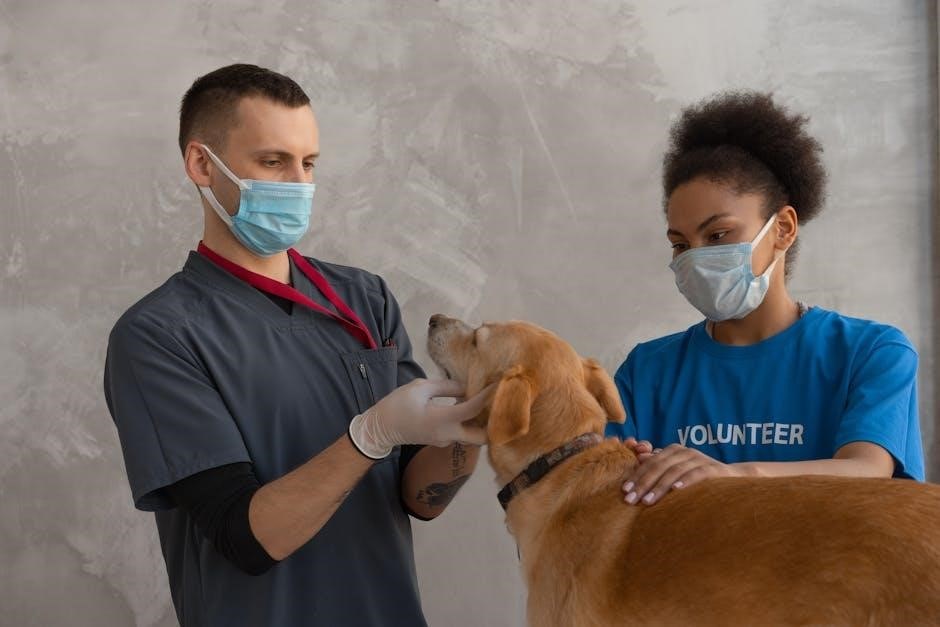Welcome to our comprehensive guide on feeding your Labrador puppy! Proper nutrition is essential for their growth and development. This guide will walk you through feeding charts, the best foods, and how often to feed your puppy to ensure they thrive. Monitoring their growth and adjusting portions is key to raising a healthy Labrador.
1;1 Importance of Proper Nutrition for Labrador Puppies
Proper nutrition is crucial for Labrador puppies, as it directly impacts their growth, development, and overall health. A well-balanced diet ensures they have enough energy to thrive and supports the development of strong bones and muscles. Labradors are an energetic breed, so adequate nutrition helps maintain their high energy levels. Additionally, proper feeding prevents obesity and other health issues, making it essential to provide a diet tailored to their needs from an early age.
1.2 Overview of a Labrador Puppy’s Dietary Needs
A Labrador puppy’s diet must be rich in high-quality protein for muscle growth, healthy fats for energy, and essential vitamins and minerals. They require a balanced mix of nutrients to support rapid growth and development. Proper hydration and portion control are also vital. A well-structured diet ensures they receive everything needed for optimal health, avoiding deficiencies or excesses that could lead to long-term issues.

Understanding Labrador Puppy Nutritional Requirements
Labrador puppies need a diet rich in protein, fats, and carbohydrates for energy and growth. Essential vitamins and minerals, like calcium and phosphorus, support bone development and overall health.
2.1 Protein Requirements for Growth and Development
Labrador puppies require high-quality protein for muscle growth and development. Sources like chicken, fish, and lamb are ideal. Protein should make up 22-28% of their diet. Adequate protein supports tissue repair and energy production. Ensure the food meets AAFCO standards for puppies. Avoid fillers and by-products, as they reduce protein quality. Proper protein intake ensures a strong, healthy foundation for your Labrador’s growth and activity levels.
2.2 Role of Fats and Carbohydrates in Puppy Diets
Fats provide essential energy and support skin and coat health in Labrador puppies. Carbohydrates, like whole grains, offer sustained energy. Fats should account for 8-12% of their diet, while carbs provide fiber and nutrients. Balanced fats and carbs ensure optimal energy levels and overall health, supporting their active lifestyle and growth needs.
2.3 Essential Vitamins and Minerals for Puppies
Vitamins A, D, and E support vision, immune function, and skin health in Labradors. Minerals like calcium and phosphorus are crucial for bone development, while zinc aids in growth and digestion. A balanced mix of these nutrients ensures proper development, prevents deficiencies, and supports long-term health, making them vital components of a Labrador puppy’s diet for optimal growth and well-being.

Feeding Schedule for Labrador Puppies
Labrador puppies require a structured feeding schedule to ensure proper growth. Start with 3-4 meals daily for young pups, gradually reducing to twice a day as they mature.
3.1 How Often to Feed Your Labrador Puppy
Labrador puppies need consistent feeding schedules. Puppies under 3 months should eat 3-4 meals daily, while those over 6 months can transition to 2-3 meals. Follow feeding charts on the food bag for portion sizes, as overfeeding can lead to obesity. Avoid free-feeding, and monitor their energy levels and growth to adjust frequency. Always consult your vet for personalized feeding plans tailored to your puppy’s needs and development stage.
3.2 Adjusting Feeding Frequency as Your Puppy Grows
As your Labrador puppy grows, their feeding frequency needs adjustment. Puppies under 3 months typically require 3-4 meals daily, while those over 6 months can transition to 2-3 meals. Monitor their growth, energy levels, and weight to avoid overfeeding, which can lead to obesity. Use feeding charts on the food bag as a guide, but tailor the schedule to your puppy’s individual needs. Consult a vet if you notice any health concerns or significant changes in appetite or weight.

Best Foods for Labrador Puppies
High-quality puppy food is crucial for Labradors. Look for balanced nutrition with protein as the first ingredient, essential vitamins, and minerals. Avoid fillers and artificial additives for optimal health.
4.1 Commercial Puppy Foods: Wet vs. Dry
Choosing between wet and dry commercial puppy foods depends on your Labrador’s needs. Wet food offers higher moisture content, which can aid digestion, while dry food supports dental health. Both options provide balanced nutrition, but consult your vet to determine the best choice for your puppy’s specific requirements and preferences.
4.2 Raw Diets for Labrador Puppies
Raw diets for Labrador puppies consist of uncooked ingredients like meat, bones, and organs, mimicking their natural diet. While some owners swear by the benefits, such as improved digestion and reduced allergies, raw diets carry risks like bacterial contamination and nutritional imbalances. Always consult a vet before transitioning to raw feeding to ensure it meets your puppy’s needs and is safely prepared.
4;3 Homemade Diets: Pros and Cons
Homemade diets for Labradors offer customization and control over ingredients, which can be beneficial for puppies with allergies or specific needs. However, they require careful planning to ensure a balanced mix of nutrients. Without proper guidance, homemade diets can lead to deficiencies or over-supplementation, making it crucial to consult a vet or canine nutritionist to create a well-rounded, healthy meal plan for your puppy.
Portion Sizes and Growth Monitoring
Use feeding charts for accurate portion sizes based on your puppy’s size and growth rate. Monitor their development and adjust portions to ensure healthy growth and prevent overfeeding.
5.1 Using Feeding Charts for Accurate Portion Sizes
Feeding charts provide specific guidelines for portion sizes based on your Labrador puppy’s age, weight, and activity level. Follow the manufacturer’s recommendations on the food label, adjusting as your puppy grows. Monitor their physical condition and consult your veterinarian to ensure portions align with their growth rate and energy needs for optimal health.
5.2 Monitoring Growth and Adjusting Portions
Regularly monitor your Labrador puppy’s growth by tracking weight, body condition, and energy levels. Schedule frequent vet check-ups to ensure they’re on the right growth trajectory; Adjust portion sizes as your puppy progresses through growth stages, especially during growth spurts or plateaus. Tailor feeding schedules to their developmental needs, ensuring balanced nutrition without overfeeding or underfeeding.
Supplements for Labrador Puppies
Supplements can support a Labrador puppy’s growth, but use them cautiously. Avoid over-supplementation, as it may lead to imbalances. Consult your vet before adding any supplements to ensure they meet your puppy’s specific needs and complement their diet effectively.
6.1 When and How to Add Supplements
Supplements should only be added if your Labrador puppy’s diet lacks essential nutrients. Consult your veterinarian to determine the best timing and type of supplements. Start with small amounts and gradually increase as needed. Avoid over-supplementation, as it can cause imbalances. Always choose high-quality options and monitor your puppy’s response to ensure they are beneficial. Natural sources, like bone meal, can be considered but only under professional guidance.
6.2 Avoiding Over-Supplementation
Over-supplementation can lead to nutrient imbalances, potentially harming your Labrador puppy’s health. Avoid adding unnecessary vitamins or minerals, as high-quality puppy foods are typically balanced. Excess calcium or phosphorus can disrupt growth, while too many vitamins may cause toxicity. Always consult your veterinarian before adding supplements to ensure they are needed and safe. Monitor your puppy’s response to avoid overloading their system with unnecessary additives.
Common Feeding Mistakes to Avoid
Common feeding mistakes include overfeeding, leading to obesity, and underfeeding, causing nutritional deficiencies. Ensure portion control and avoid unhealthy treats to maintain your puppy’s balanced diet and health.
7.1 Overfeeding and the Risk of Obesity
Overfeeding is a common mistake that can lead to obesity in Labrador puppies. Excess weight strains their joints and increases health risks. Monitor portion sizes carefully and avoid unhealthy treats. Ensure meals are balanced and consult your vet to prevent overfeeding. Regular exercise and a structured feeding schedule help maintain a healthy weight and overall well-being for your puppy.
7.2 Underfeeding and Nutritional Deficiencies
Underfeeding can lead to stunted growth and nutritional deficiencies in Labrador puppies. Ensuring adequate portion sizes and a balanced diet is crucial. Refer to feeding charts and consult your vet to avoid underfeeding. A lack of essential nutrients can cause health issues, so monitor your puppy’s weight and energy levels closely. Proper nutrition supports healthy development and prevents long-term complications.

Health Monitoring and Veterinary Care
Regular monitoring of your Labrador puppy’s health is crucial. Watch for signs of illness, such as lethargy or loss of appetite. Schedule regular veterinary check-ups to ensure proper development and address any potential health issues early. This helps prevent long-term problems and ensures your puppy thrives.
8.1 Signs of a Well-Fed Puppy
A well-fed Labrador puppy exhibits a shiny coat, energetic demeanor, and steady weight gain. They should have a healthy appetite, firm stools, and no signs of lethargy. Proper nutrition ensures robust growth, bright eyes, and a playful personality. Regular weight checks and a full, rounded appearance indicate optimal feeding. Consult your vet if you notice any deviations from these signs of good health.
8.2 When to Consult a Veterinarian
Consult a veterinarian if your Labrador puppy shows signs of poor health, such as loss of appetite, weight loss, or digestive issues. Lethargy, skin problems, or unexpected weight gain are also red flags. If your puppy refuses food for more than a day or shows extreme pickiness, seek professional advice. Regular check-ups ensure your puppy’s diet is balanced and address any emerging health concerns early.
Emergency Feeding Situations
Emergency feeding situations include refusal to eat or severe digestive issues. Contact your vet immediately. Keep emergency vet numbers handy for quick assistance and guidance.
9.1 What to Do if Your Puppy Stops Eating
If your Labrador puppy stops eating, contact your vet immediately to rule out health issues. Check for obvious causes like dental problems or an upset stomach. Try warming their food to make it more appealing. Offer small, frequent portions if they’re picky. Avoid forcing food unless advised by your vet. Hand-feeding can be a last resort to encourage eating, but always consult a professional first.
9.2 Managing Food-Related Emergencies
Keep your vet’s contact information handy for emergencies. Watch for signs like vomiting, diarrhea, or lethargy after eating. If your puppy ingests something harmful, contact a pet poison hotline. For choking, gently open their mouth to remove obstructions. Offer small amounts of bland food like boiled chicken and rice if they’re unwell. Prevent emergencies by securing toxic substances and supervising meals to ensure your puppy’s safety.
Proper feeding is crucial for your Labrador puppy’s health. Follow guidelines, monitor growth, and consult your vet for a thriving, happy puppy.
10.1 Summary of Key Feeding Guidelines
- Use feeding charts to determine accurate portion sizes for your Labrador puppy.
- Choose high-quality puppy food that meets nutritional standards for growth.
- Feed 3-4 times daily for puppies under six months, reducing to twice daily as they mature.
- Monitor growth and adjust portions to prevent underfeeding or overfeeding.
- Consult a veterinarian for personalized advice and to address emergencies.
- Avoid over-supplementation to ensure a balanced diet.
- Ensure meals are nutrient-rich, with protein as the primary ingredient.
10.2 Final Tips for Raising a Healthy Labrador
- Consistency is key—maintain a regular feeding and exercise routine.
- Provide mental stimulation through training and socialization.
- Ensure regular veterinary check-ups for health monitoring.
- Offer plenty of love, patience, and positive reinforcement.
- Be prepared for emergencies with a vet contact handy.
- Create a safe, comfortable environment for your puppy to thrive.

Leave a Reply